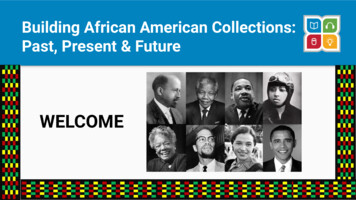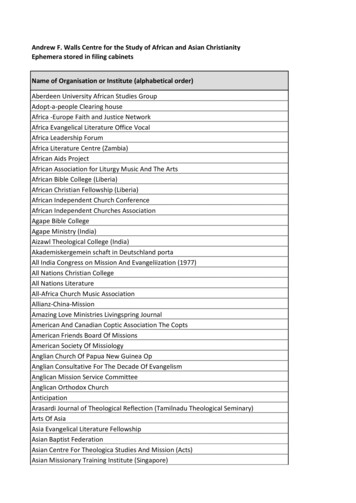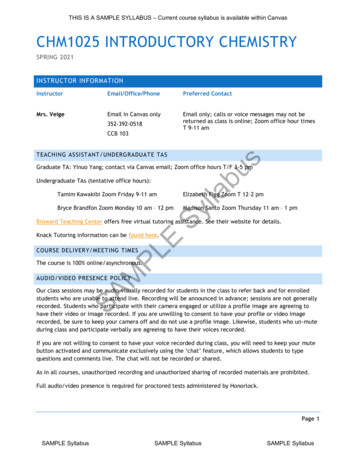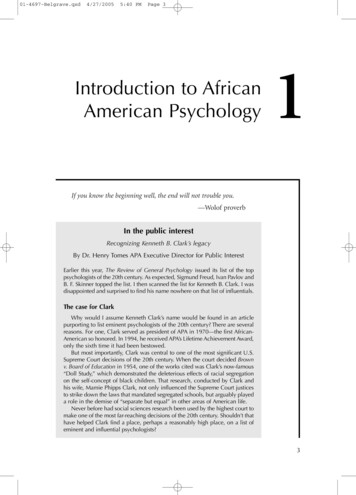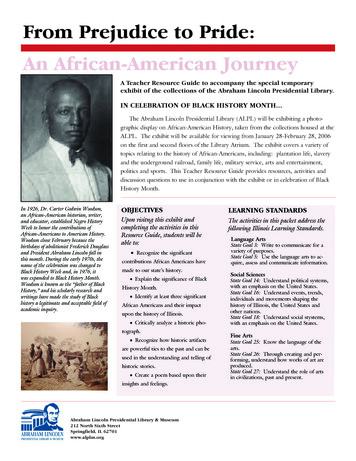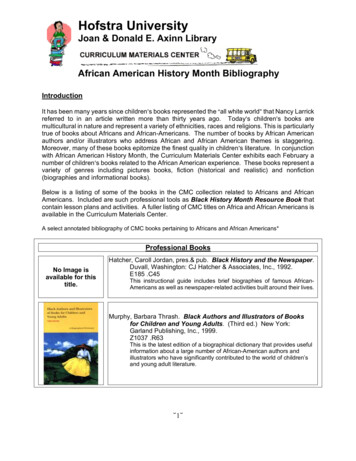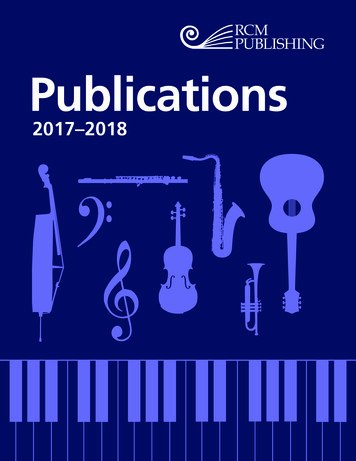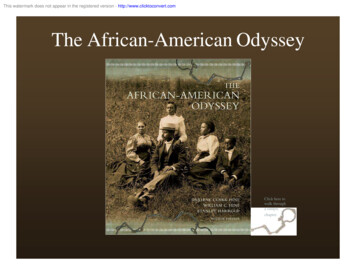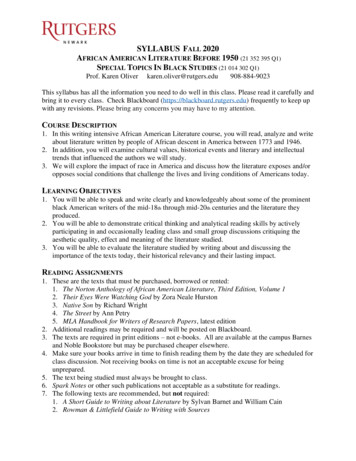
Transcription
SYLLABUS FALL 2020AFRICAN AMERICAN LITERATURE BEFORE 1950 (21 352 395 Q1)SPECIAL TOPICS IN BLACK STUDIES (21 014 302 Q1)Prof. Karen Oliverkaren.oliver@rutgers.edu908-884-9023This syllabus has all the information you need to do well in this class. Please read it carefully andbring it to every class. Check Blackboard (https://blackboard.rutgers.edu) frequently to keep upwith any revisions. Please bring any concerns you may have to my attention.COURSE DESCRIPTION1. In this writing intensive African American Literature course, you will read, analyze and writeabout literature written by people of African descent in America between 1773 and 1946.2. In addition, you will examine cultural values, historical events and literary and intellectualtrends that influenced the authors we will study.3. We will explore the impact of race in America and discuss how the literature exposes and/oropposes social conditions that challenge the lives and living conditions of Americans today.LEARNING OBJECTIVES1. You will be able to speak and write clearly and knowledgeably about some of the prominentblack American writers of the mid-18th through mid-20th centuries and the literature theyproduced.2. You will be able to demonstrate critical thinking and analytical reading skills by activelyparticipating in and occasionally leading class and small group discussions critiquing theaesthetic quality, effect and meaning of the literature studied.3. You will be able to evaluate the literature studied by writing about and discussing theimportance of the texts today, their historical relevancy and their lasting impact.READING ASSIGNMENTS1. These are the texts that must be purchased, borrowed or rented:1. The Norton Anthology of African American Literature, Third Edition, Volume 12. Their Eyes Were Watching God by Zora Neale Hurston3. Native Son by Richard Wright4. The Street by Ann Petry5. MLA Handbook for Writers of Research Papers, latest edition2. Additional readings may be required and will be posted on Blackboard.3. The texts are required in print editions – not e-books. All are available at the campus Barnesand Noble Bookstore but may be purchased cheaper elsewhere.4. Make sure your books arrive in time to finish reading them by the date they are scheduled forclass discussion. Not receiving books on time is not an acceptable excuse for beingunprepared.5. The text being studied must always be brought to class.6. Spark Notes or other such publications not acceptable as a substitute for readings.7. The following texts are recommended, but not required:1. A Short Guide to Writing about Literature by Sylvan Barnet and William Cain2. Rowman & Littlefield Guide to Writing with Sources
Fall 2020 Syllabus African American Literature after 1950 (21 352 395 Q1); Topics in Black Studies (21 014 302 Q1)2WRITING ASSIGNMENTSRutgers University Academic Integrity PolicyPlagiarism is not tolerated. As an academic community dedicated to the creation, dissemination,and application of knowledge, Rutgers University is committed to fostering an intellectual andethical environment based on the principles of academic integrity. Academic integrity is essentialto the success of the University’s educational and research missions, and violations of academicintegrity constitute serious offenses against the entire academic community. For details, c- integrity-policy/Personal Essays1. You will write several two-page (no more, no less) personal essays intended to present yourindividual reactions and responses to the texts studied.2. Research for the personal essay is not needed and, in fact, is discouraged.3. Essays submitted more than one week after the due date will not be accepted.4. Grades for late essays will be reduced based on the number of days late.Biography Research Paper - Due October 10.1. Each student will write a 2,000-word (not significantly more or less) research paper about thethoughts, beliefs and philosophies of an assigned author and a researched analysis of a poem,short story, play, essay or novel written by the author.2. The paper must focus on important details of the author’s writing life, beliefs, significantevents, literary contributions and the trends that influenced him or her – not trite statisticalinformation about the writer’s life such as birth, death and school records.3. The paper must reference four or more scholarly research sources that are not part of thecourse reading and that support the thesis of the paper.4. Biography.com, Wikipedia and similar websites are unacceptable as research sources.5. Papers submitted more than one week after the due date will not be accepted.6. Grades for late papers will be reduced based on the number of days late.Final Research Paper - Due on December 5.1. You will write a 2,000-word research paper (not significantly more or less) on a challengingtopic of your choice that examines an issue, question or argument related to the coursecontent.2. The paper must take a position on the issue, defend the position and make a conclusion.3. The paper must center on the selected text(s), not just refer to the text(s) in passing.4. The paper will demonstrate how the issues, themes and objectives uncovered in the selectedtext(s) are reflected in actual lived experiences.5. The paper must reference four or more scholarly research sources that are not part of thecourse reading and that support the thesis of the paper.6. Wikipedia and similar websites are unacceptable as research sources.7. This paper will not be accepted after the due date.8. If you do not submit the final research paper, you will not pass the course, regardless ofyour other grades.You are expected to read this syllabus in its entirety and refer to it throughout the semester
Fall 2020 Syllabus African American Literature after 1950 (21 352 395 Q1); Topics in Black Studies (21 014 302 Q1)3General Writing Guidelines1. All writing assignments must follow the MLA guidelines for student papers.2. Your submission must be typewritten and carefully spell-checked, edited and proofread.3. All writing assignments must have a title that you create that reflects the message and contentof the research paper or essay.4. The first line of every paragraph must be indented. Do not include extra space betweenparagraphs. If your version of Microsoft Word defaults to extra space between paragraphs,select Format, then paragraph, then check “Don’t add space between paragraphs of the sameformatting.”5. The first page should have your first and last name, the date, the class, and my name in theupper left-hand corner – single spaced. E.g.:Angela WilliamsonAfrican American LiteratureSpring 2020Professor Karen OliverOctober 6, 20206. After page one, all pages must have your name and the page number in the upper right-handcorner.7. All writing assignments must be posted on Blackboard as a Doc or Docx file – not PDF.WEEKLY ASSIGNMENTS / EXAMS1. You must submit three thoughtful questions about the text (refer to page numbers) by 8 a.m.on each Saturday to be used for class discussion. The questions should be on the text’sconcept, characters, theme, symbols, style, form, meaning, and historical context, somethinginteresting or hard to understand, etc.2. There will be short quizzes focused on the reading assignment due that day.3. There are no make-ups for missed quizzes.4. The final exam on December 19 will cover the literature and class discussions studied duringthe semester.ZOOM CLASSROOM ETIQUETTECivil and Respectful Learning Environment.1. You must participate with the camera on and your name displayed.2. You must be dressed in a presentable way as you would in an in-person class.3. Ours is a learning environment where we all can feel comfortable asking questions andmaking statements without fear of being interrupted, ridiculed or threatened.4. Classroom discussion is meant to allow us to hear a variety of viewpoints. This can onlyhappen if we respect each other and our differences.5. Disagreeing with and challenging each other is encouraged but must be done in a respectfuland thoughtful way.6. If you use or engage in threatening, disrespectful, demeaning, profane or vulgar languageand/or behavior, you will be removed from the class for the day.7. When you have a comment or question, raise your hand virtually and wait to be called on.You are expected to read this syllabus in its entirety and refer to it throughout the semester
Fall 2020 Syllabus African American Literature after 1950 (21 352 395 Q1); Topics in Black Studies (21 014 302 Q1)4Class Participation.1. You are required to participate in classroom discussions about the texts studied.2. Before speaking, ask yourself “W.A.I.T. Why Am I Talking?”a. Think before you speak – has somebody already made the point you would like tomake?b. Have you spoken a lot already?c. Can you take an opportunity to practice your active listening and make room for othervoices that haven’t been heard yet?d. Does your comment relate to the topic being discussed or is it personal or about adifferent topic that can be discussed later?3. Raise your hand virtually and wait to be called on before speaking. If you think you mayforget your comment or question before being recognized, write it down.4. Classroom participation will be reflected in your final grade.Attendance and Lateness.1. Class begins at 9 a.m. You are expected to be on logged in on time and ready to participate.2. Class ends at 12:15 p.m. Please do not sign off before then.3. Attendance is mandatory and will be recorded at each class.4. You are allowed two excused absences – which must be appropriately documented.5. Three absences are grounds for failure in this course.6. It is better to come to class late than not to come at all, but frequent lateness will affect yourgrade. Two unexcused late arrivals equal one absence.7. If you leave before the end of class without permission, or if you leave the class for extendedperiods of time without permission and then return, you will be marked absent for the entireclass.8. If you miss a class, it is your responsibility to get notes, homework assignments, etc. fromclassmates and to submit assigned work on the due date.Technology.Keep your cell phone off and put away during class.You are expected to read this syllabus in its entirety and refer to it throughout the semester
Fall 2020 Syllabus African American Literature after 1950 (21 352 395 Q1); Topics in Black Studies (21 014 302 Q1)5GRADINGFormula for Final Grade.Your grade for the semester is calculated on the following basis:1. Participation, personal essays, quizzes, attendance, general effort2. Biography paper3. Final research paper4. Final examGeneral grading guidelinesA Outstanding work beyond expectations. Extremely accomplished, creative, visionary, representing all thatwas required of the assignment and more.B Exceeds expectations but is lacking in some aspects of the assignment.C Satisfactory, average achievement that is acceptable but not exceptional. Misses some of the requirementsbut shows a broad understanding of the requirements of the assignment.D Poor, substandard work. Key points were missed. Substantial work is required to meet basic expectations.FAssignment not done or fails to meet the requirements.Grading for class participationABCDFYou are a class leader who almost always contributes to discussions and encourages others to respond.You ask questions or build on the comments of others and support your position with evidence from thetext.You frequently contribute to class discussion and sometimes are a class leader.You share useful and relevant ideas and opinions but not frequently and you don’t support your ideaswith examples from the text. You rarely engage others. You come to class prepared but you are not aleader.You never or rarely participate in class discussions, or, if you do, your ideas are vague or not clearlyarticulated.You did not complete the reading assignment. You are extremely late. You make insulting comments;interrupt when others are speaking; hold side conversations; dominate discussions with off-topic points;sleep in class; engage in disruptive, obnoxious or disrespectful behavior.RUTGERS UNIVERSITY OFFICE OF DISABILITY SERVICES.Suite 219, Paul Robeson Campus Center (973) 353-5315; act-odsRutgers University welcomes students with disabilities into all of the University’s educational programs.In order to receive consideration for reasonable accommodations, you must complete and submit theRegistration Form, schedule and complete an intake meeting, and submit appropriate documentation. Ifyour request for reasonable accommodations is approved, you will receive a Letter of Accommodations,which you should present privately to the instructor as early in the semester as possible. Accommodationsare not retroactive and are effective only upon submission of the LOA to the instructor. Please begin theprocess by completing and submitting the Registration Form, Applying for Services, available ervicesRELIGIOUS HOLIDAY POLICY.Students are advised to provide timely notification to instructors about necessary absences for religiousobservances and are responsible for making up the work or exams according to an agreed-upon schedule.You are expected to read this syllabus in its entirety and refer to it throughout the semester
Fall 2020 Syllabus African American Literature after 1950 (21 352 395 Q1); Topics in Black Studies (21 014 302 Q1)6LEARNING RESOURCES.Rutgers Learning Center (tutoring services), Room 140, Bradley Hall; (973) 353-5608;http://www.ncas.rutgers.edu/rlcWRITING CENTER.Provides tutoring and writing workshops. Room 126, Conklin Hall (973) 353-5847; ENGLISH DEPARTMENT CORE LITERATURE tationsDMarginalFUnacceptableThesisCentral claim iscontroversial,insightful,sophisticated, andunexpected. Thesisis stated clearly andforcefully, leavingno doubt where theargument is going.Central claim isreasonable, buteither simpler, lesssophisticated, orless controversialthan an A thesis. Itmay lack subtletyor nuance; the ideamay beunmanageable.Central claim maybe too obvious ortoo broad to beconvincing. Plotsummary or vagueclaims about“importance” maytake the place ofspecific argument.Mere summaryinstead ofargument, orclaims too obvious.Essay may not askthe right kind ofquestion, orsignificant parts ofthe text may bemisunderstood.No central claim,or justmiscellaneousobservations. Thebasics of the textare misunderstood.OrganizationIntroduction clearlystates the thesis;argument developslogically with cleartransitions; aconclusionconvincingly tiesthe argumenttogether. Helpfullyguides the reader tothe conclusion.Argument is notalways developedin a way that ishelpful to thereader. Theconclusion doesn’tquite bringeverythingtogether.Structure does notserve the readerwell; reader has tostruggle to followthe argument.Essay disjointed.Paragraphing notused to best effect.Structure doesn’tguide the readerthrough the paper.Argument doesn’tbuild from point topoint; it may bedisjointed or driftwithout direction.Paragraphingproblems.No discerniblestructure. Thereader has tostruggle to followthe argument fromintroduction toconclusion.Evidence andClose ReadingAll claims aregrounded in thetexts withimpressiveattention tolanguage and othertextual details.Judicially selectedevidence convincesthe reader to acceptthe thesis. Essay issensitive tonuances.Most but not allevidence supportsthe thesis.Generalization maytake the place ofcareful attention tothe text. Linksbetween theevidence and thethesis are notalways clear.Evidence may besuperficial, basedonmisunderstandingthe text orhistorical context.Paraphrase maytake the place ofcareful engagementwith the text.Important evidencemay be neglected.Evidence does notsupport the thesis,or is irrelevant,oversimplified, ormisinterpreted.Paraphrase orsummary takes theplace of carefulengagement withthe details of thetext.Little or noevidence drawnfrom the text, orthe text is seriouslymisinterpreted.You are expected to read this syllabus in its entirety and refer to it throughout the semester
Fall 2020 Syllabus African American Literature after 1950 (21 352 395 Q1); Topics in Black Studies (21 014 302 ionsDMarginalFUnacceptableResearchThe best sourcesconvincinglyintegrated into thethesis. Varioussources areaccorded theappropriate degreeof authority. Allsources citedproperly.Researchcontributesadequately to thethesis. Appropriateattention to theauthority of varioussources. Sourcesare cited.Some researchbrought to bear onthe subject, notalwayssuccessfully.Sources usedwithout properregard for theirauthority, or are notcited properly.Research notconvincinglyintegrated into theessay, and usedwithout regard foraccuracy orrelevance. Sourcesnot cited.Sources notcredible or notintegrated into theargument. Noattempt made tocite evidence. Anypassage of theessay isplagiarized.Grammar,Style, andMechanicsStyle is graceful,clear, engaging,and suited to theaudience. Dictionis precise,sentencesdemonstratevariety, technicalterms are usedcorrectly, andmechanical errorsare minimal. Nowords are wasted.Style is generallyclear and with nosubstantial flaws.Sentences are wellconstructed andterms are usedprecisely.Mechanical errorsare limited.Prose is awkward,verbose, or unclear.It may be toocolloquial or toostilted. Diction maybe vague orinappropriate.Mechanical errors,but not so many tothreaten thereader’scomprehension.Serious problemswith coherence andsentence clarity, ormechanicalproblems thatinterfere withcomprehension.Terms are usedimprecisely. Proseis awkward orverbose, makingthe reader struggle.The writing isconfusing,awkward, orverbose, andmarred bymechanicalproblems thatinterfere withcomprehension.Diction impreciseand sometimesinappropriate forthe subject.You are expected to read this syllabus in its entirety and refer to it throughout the semester
Fall 2020 Syllabus African American Literature after 1950 (21 352 395 Q1); Topics in Black Studies (21 014 302 Q1)8CLASS SCHEDULE.Assigned readings must be completed by the indicated date. Additional readings may be assigned duringthe semester. Spark Notes or other such publications are unacceptable as a substitute for readings. Thisschedule is tentative and may be revised. All revisions will be posted on Blackboard.Due DateAssignmentSept 5Lerone Bennett “The Road Not Taken” from The Shaping of Black America[Blackboard]Thomas Jefferson Notes on the State of Virginia excerpt [Blackboard]Sept 12Frederick Douglass (bio Norton 326)Narrative of the Life of Frederick Douglass, An American Slave (Norton 330-393)Sept 19Harriet Jacob (bio Norton 221)Incidents in the Life of A Slave Girl by Linda Brent (excerpt Norton 221-261)Sept 26David Walker (bio Norton 160)from David Walker’s Appeal To the Coloured Citizens of the World“Preamble” and “Article One” (Norton 161- 171)Booker T. Washington (bio Norton 548)from Up from Slavery (Norton 550-579)W.E.B. DuBois (bio Norton 679)from The Souls of Black Folk: “The Forethought” (Norton 687-88); “Of Our SpiritualStrivings”(Norton 688-693); “Of Mr. Booker T. Washington and Others” (Norton 694702)Oct 3Nella Larsen (bio Norton p 1079)Passing (Norton 1080 – 1141)Oct 10Biography Research Paper DueZora Neale Hurston (bio Norton 1305)Their Eyes Were Watching God by (chapters 1-10)Note: You are to buy and read the novel – not the excerpt in Norton.Oct 17Note: You are to buy and read the novel – not the excerpt in Norton.Their Eyes Were Watching God (chapters 11- end)Oct 24Richard Wright – Native Son – ‘Fear’Oct 31Native Son – ‘Flight’Nov 7Native Son – ‘Fate’Nov 14Ann Petry – The Street by (chapters 1-9)Nov 21The Street (chapters 10-end)Nov 28Dec 5Dec 19THANKSGIVING RECESS – NO CLASSFinal Research Paper Due / Class PresentationsFinal ExamYou are expected to read this syllabus in its entirety and refer to it throughout the semester
1. In this writing intensive African American Literature course, you will read, analyze and write about literature written by people of African descent in America between 1773 and 1946. 2. In addition, you will examine cultural values, historical events and literary and intellectual trends that influenced the authors we will study. 3.
